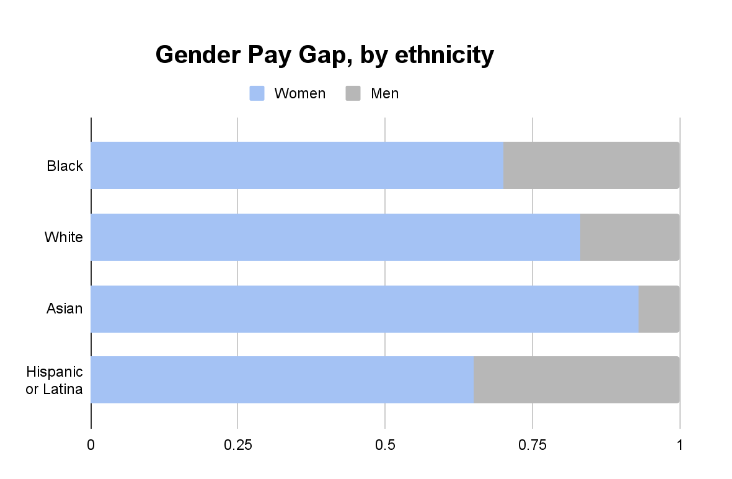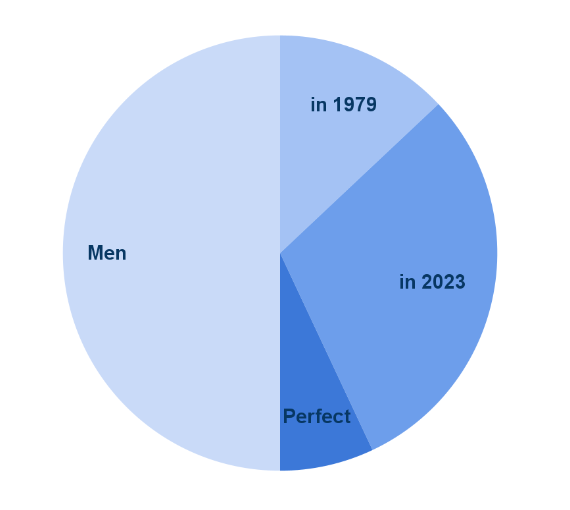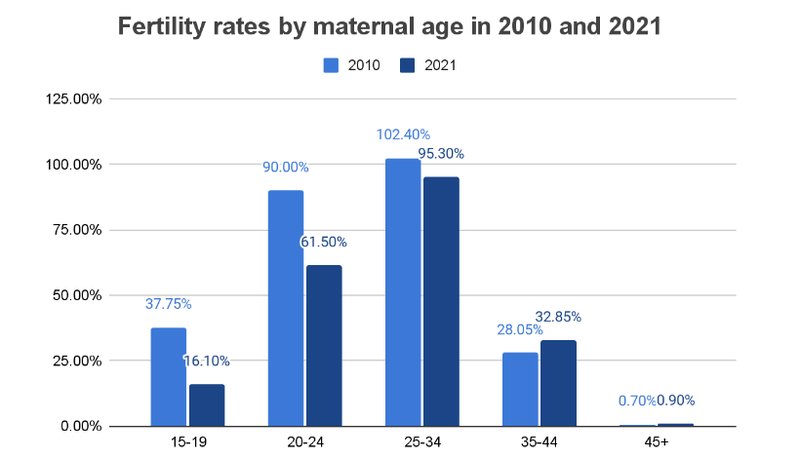People mostly divide themselves into two camps: "the gender pay gap is awful and has to be addressed" and "the gender pay gap is a myth." However, the reality is somewhere in between. To explain why, we need to specify what data researchers use and how it is processed.
How is the gap really counted
Even on big platforms like Forbes or LinkedIn, you may see people writing about the gender pay gap while misinterpreting the results. According to PayScale statistics, in 2024 American women earned 83 cents for every dollar earned by men. This is where the misconceptions begin. Let us clarify it for you.
Racial discrimination makes it worse
Yes, but not for everybody. According to the Pew Research Center, in 2022, while Black women earn 70 cents and Hispanic or Latina women earn 65 cents per dollar, Asian women earn 93 cents, which is far better than the average for all women. Why is that so? Here we move to the next point.

Researches compare the same jobs
No, they don’t. Researched data may be controlled and uncontrolled, and the results are vastly different. Uncontrolled data compare all men and all women regardless of occupation, experience, education, etc. When the data are controlled, meaning that they compare a man and a woman doing the same job, having the same education level, years of experience, and so on, the difference is 0.01 dollars. It’s not zero, and that’s a problem, but still, the difference between 0.17 and 0.01 is quite noticeable.
That is why Asian women have a smaller pay gap, as they tend to have higher-paying jobs and higher levels of education than women of other ethnicities. The same may apply to Hispanic and Latina women, as they are more likely to not have a degree. But that’s already a question of equal access to education.
There are women who earn more than men do
Yes, and that’s the norm. Because economics does not imply a situation where everyone is equal. The question is, how many women earn more? According to Richard V. Reeves's research for the book "Of Boys and Men," 40% of women now earn more than men, a huge jump from 13% in 1979. And when this number reaches 50%, we’ll be able to say that the gender pay gap is over.

As you can see, everything is much more complicated than just two opposite opinions, as the truth belongs to both of them and to neither of them at the same time. So, if the controlled data show little difference, but uncontrolled data say otherwise, what should we trust?
- Most people misinterpret research statistics incorrectly
- There is almost no gender discrimination in salaries
- 40% of women already earn more than men
What are the real causes?
Both controlled and uncontrolled data are true, but from different perspectives. The 0.01 difference shows that the Equal Pay Act from 1963 works and there is little to no discrimination based on gender when we talk about salaries. But there is gender discrimination at work in general.
Women are housekeepers
To put it simply, it's an ancient form of discrimination. Women are housekeepers, while men go hunting and face danger. It's as if, after thousands of years of evolution, nothing has changed in some people's minds.
People usually call it the second shift: when women come home after a full day of work and cook, clean, tidy up, and do all the household chores. Surely, there are families now where couples divide housework fairly, but there should be more of them, many more, to make any difference.
Women are caregivers
This one continues the story, but now we also have a child! Yay! Now women have the third shift. Oh, no, not exactly, because most of them have to leave the workforce to raise the baby, at least for 2-3 years. Some try to do part-time and remote jobs, but this decision affects their careers as well.
The median age at which women give birth is constantly rising, and by 2021, it was estimated at 27.3 years old. On average, women mostly give birth between the ages of 25 and 34, which is exactly when your career may start taking shape. So, leaving just before a promotion or losing 3 to 5 years of experience in the labor force is cruel.

To address this problem, young moms start working part-time or change career paths to manage everything they have on their shoulders at the moment. And this choice doesn't give them extra credit either. Because when their children grow up, go to kindergarten or school, and they can finally return to full-time work, employers do not welcome them. "It's been too much time since you've worked in the field"; "We can't afford to give you much time off to care for your child when you'll need it"; "Our company does not offer flexible hour jobs" - these are the typical answers women get.
In fact, in the US as of now, there is no universal decision that will help women build a successful career and be a caring, loving mother who raises her child. Most of the problems come from the fact that in our society, there is still an old mindset that the best a father can do for his baby is to earn money. And it’s so ridiculous in 2024!
Dads are dads, not just wallets
Long gone are the times when men had to be strong and fearless to survive. Now, it's just a balance between work and life. Unfortunately, there are still men who do not really care about this balance and give everything they have to work to earn extra.
There are hundreds of studies showing that children are much happier when they have two loving parents instead of one parent and a living wallet. We can't blame men; we need to blame society, which is changing too slowly and can't adapt to new realities.
Women are delicate flower petals
Women are often expected to be soft, gentle, and kind. People don’t like it when women stand their ground, when they try to get what they really deserve, when they act like men do at work. Some argue that women are paid less because they ask for less and cannot negotiate effectively.
In fact, studies show that women do negotiate; however, people perceive such action as arrogance and are less likely to hire them. Men, on the other hand, negotiate less because they initially receive better offers. But when they do negotiate, employers see it as a 'fair enough' thing.
- People still expect women to do all the housework and then blame them for not working more hours
- Women have to leave the workforce to care for their baby at the most critical moment for their career
- After the forced maternity leave, women are not welcomed back
- Fathers do not often choose their child when they have to choose between family and career
- Women are seen as arrogant and 'too much' when they try to negotiate their salary
What can we do about it
We’ve already made huge progress. In 1982, the pay gap was 65 cents per man's dollar. Now it’s about 83 cents. The number of women earning more than men has also significantly increased. These are the results of the hard work people have put into gender equality. Now it’s time to go further.
It’s time for deeper changes
Now we should start changing our home life structure, not just work life. When couples divide responsibilities equally and teach their children to do the same, there will be no ‘second shift,’ and women will be able to dedicate themselves to work more if they want to. Both men and women should be housekeepers, caregivers, and have the opportunity to build a great career.
Flexible work is not a drawback
The time will come when employers stop considering part-time jobs as a red flag and start implementing them more in their own companies. The more flexible the job is, the happier employees are, so why miss out on this chance to make your team more productive?
- There has been significant progress since the 20th century
- More couples should equally divide housework and parenting to make things changed
- Employers should implement flexible and remote job opportunities in their companies to make things changed
The gender pay gap as a whole is an echo from the past. Although life was easier, it had very strict boundaries. These boundaries are no longer applicable in the modern world, so people should start reconsidering some of the patterns they inherited from the previous generations.
